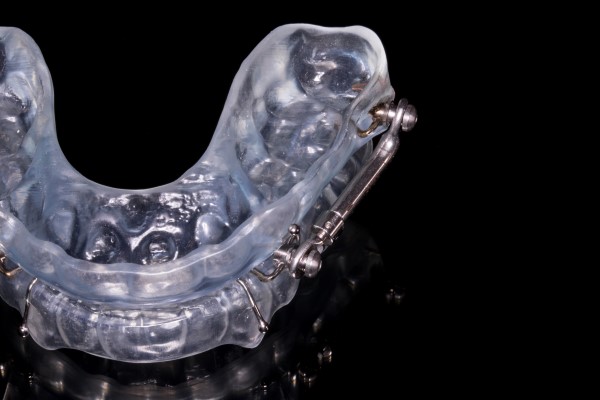How a Dental Oral Appliance Helps with Sleep Apnea

An oral appliance is one of the treatment options for sleep apnea. Many patients prefer this type of device because they are more comfortable than wearing a mask and that they are portable and can be moved around easily. It is a convenient and less-invasive way to treat the symptoms of sleep apnea. Continue reading to learn more about how an oral dental appliance works for sleep apnea.
How oral appliances for sleep apnea work
The device fits over the upper and lower teeth, in a similar way to a dental retainer. It works by moving and retaining the tongue and jaw in a forward position to prevent them from blocking the airway even if the muscles of the air passages relax completely during sleep.
The upper and lower sections are linked with a piston and tube, which only limit how much the jaw retrudes. As soon as the muscles relax while in a deep sleep, the tubes lower and the chin is held forward. The airway will remain open throughout sleep so that the patient can continue to breathe normally.
Points to consider with oral appliances
An oral appliance is meant for mild to moderate cases of sleep apnea only. For patients with severe sleep apnea, an oral device may not be advisable as the support may not be adequate for compromised air passage. The dentist may also recommend oral appliances so that a patient can tolerate the CPAP machine better.
After about two to six months of using the device, the jaw should have advanced considerably. At first, the appliance will slightly shift the lower jaw forward, and as patients get familiar with this and their jaw muscles relax, the dentist will increase the tension. The process is done gradually to reduce the risks of side effects. By the end of the adjustment phase, the dental appliance will be fully optimized for sleep apnea treatment.
Getting a dental appliance
There are various suppliers of oral devices on the internet. These devices are relatively inexpensive but are usually not effective for sleep apnea treatment. They are not custom-fit, and poor fitting oral devices can cause teeth movement and potential tooth loss. It is advisable to visit a dentist that has experience providing the dental appliance. The dental professional will perform an important assessment to know whether the device will be effective for treating sleep apnea.
When the patient visits the dentist, they will have impressions or molds of their teeth taken. With the impressions, the dentist will recreate a plaster replica of the patient’s bite and perform preliminary fitting to see how effective the mandibular advancement devices will be. If the patient cannot move their jaw forward properly, the treatment may be ineffective.
Final note
An oral appliance can be a practical and efficient solution for treating snoring and sleep apnea. It is vital that you visit an experienced general dentist and ensure that the device is fitted and adjusted regularly.
Request an appointment here: https://columbiadentaloffice.com or call Columbia Advanced Dental Studio at (410) 635-5105 for an appointment in our Columbia office.
Check out what others are saying about our services on Yelp: Sleep Apnea in Columbia, MD.
Related Posts
Have you considered turning to cosmetic dentistry services to restore your smile? If you do not like the way your teeth look, there are solutions. Your cosmetic dentist has multiple options to help you feel good about the way you look once more. You no longer have to hide your face or avoid being around…
General dentistry happens to include restoring teeth that are in bad shape or completely missing. Of course, a restoration is meant to bring the tooth back to its original shape, form, and function. However, in some cases, this is not all the way possible, making it necessary to undergo something like a dental bridge placement.…
Many individuals are apprehensive about finding a restorative dentist. They want a dentist who can help them restore their smile to look more natural and appealing. This field of dentistry is concerned with repairing damage to the teeth and restoring normal dental functions.The restorative dentist must be ready to listen to their patients about their…
Most parents do not take their children to see a family dentist until they are well over two years of age. Dental professionals recommend that a child should visit the dentist within six months after teething starts. Baby teeth often start coming in from six months of age. Continue reading to learn more about children’s…
